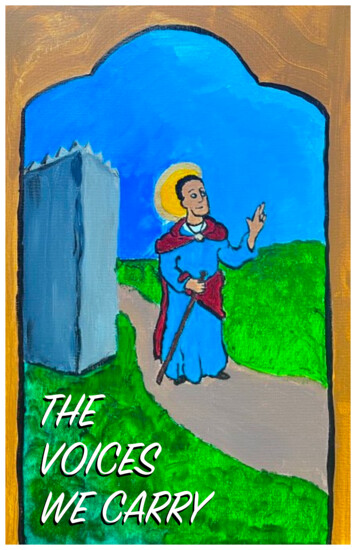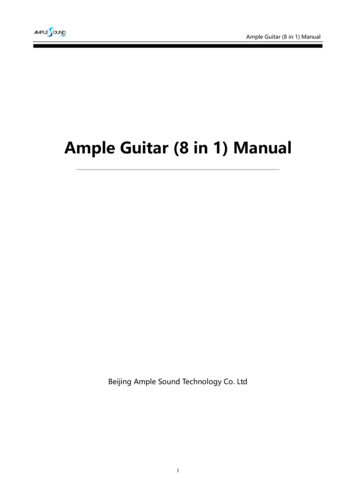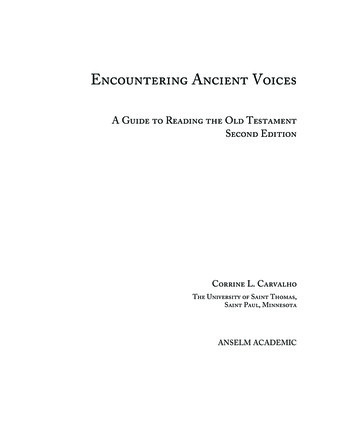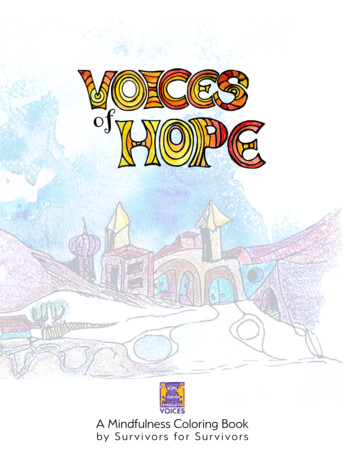
Transcription
THEVOICESWE CARRY
Special ThanksSpecial thanks to Elise Deal, Gina Campagnini-Ruiz andSteven Allen who made this prayer devotional possible throughtheir generosity and giftings. Thank you, Elise, for always clarifyingmy muddled thoughts on paper. Gina, thank you for decorating eachpage with your artistic interpretation of European monastic blocklettering in the style of Ethiopian culture. Thank you, Steven, foryour generous aid in these technological times.The additional art prepared for this devotional was inspiredby studies of medieval Ethiopian art, most notably from theStephanite tradition.ScripturesTaken from the Holy Bible, NEW INTERNATIONAL VERSION Copyright 1973, 1978, 1984 International Bible Society.All rights reserved throughout the world.Used by permission of International Bible Society.Brought to you byCornerstone Assembly of God10551 Chalkley RoadRichmond, VA 23237-4132804-748-8613
INTRODUCTIONThe Stories We Tell, The Voices We Carryveryone loves a good story. The mind thinks of a warm campfire,softly lighting the faces of the family gathered around theburning embers hearing the tales of past generations. Or thebright illumination projecting off a cinema screen as the surroundedsound belts a moving speech with a swell of strings as a tearsqueaks out the corner of an eye.Whether we recognize it or not, we define our lives by the stories wetell and the voices we carry. How many of us have dreamed oflegacy? A legacy that will be passed on through the ages. A story. Asynopsis of our lives and the impact we made in the fleeting yearswe walked on this spinning orb.How many of us stared at the ceilings of our childhood bedrooms,basking before a vast, invisible crowd as we received an award thatwe dedicated to all the teachers who told us we wouldn’t amount toanything? With every sleepless night we were trying to rewrite ourstories, to paint over the condemning voices of others.How many of us have felt the sting of standing in the shadows ofthose stories that went before us? The giants of the past with theirseemingly superhuman gifts and talents tempting us to give up, tocount out the brevity of our days in the cool shade of other people’sstories.Willie James Jennings once wrote that “There is no life without story.We enter story from the time we are born and never exit story evenin death.” Every Christian can easily attest to this as we read thepages of Scripture, the story of God’s love saturating space andtime, not in an ill-defined or theoretical way, but in everydayrelationships with men and women just like us. God so loved theworld that He created a man named Adam and a woman namedEve. He loved them so much that he gave them freewill and a way ofrestoration when they fell.God so loved the world that He encircled all people, every languageand tribe, and called them by name. And to make that love and planof redemption known He chose one man, one woman, one family:Abraham, Sarah and the people that sprang forth from God’spromise.
God so loved the world that He allowed Joseph to experiencesorrow and rejection from his brothers, sold into slavery into aforeign land, so that that when the time came he would rise up tosave not only the dysfunctional family that left him for dead, but allthe peoples of the region (even the very ones who enslaved him!).These stories resonate with us because we know what it feels like tofail. To fail ourselves. To fail others. To fail God. These stories beatwith the rhythm of our drums because we know what it’s like to feellonely like Adam in the garden. We know what it feels like to feelbroken like Sarah suffering from decades of infertility. We know whatit’s like to feel the sting of rejection from our loved ones or from thecommunity around us.Consider his beautiful thought: into the stories of each man andwoman of the Bible, God speaks. He sees them as they strugglefrom internal voices. He hears the condemnation that weighs themdown from external voices. And in response, God speaks. He takesthe stories we tell and redeems them. He takes the voices we carryand He transforms them.Setting the StageWhen we look at Acts 6, we see the mix of voices shouting insideand outside. We are reminded of the cross-cultural nature of theearly church, made of Jerusalem Jews and the Jews who wereshaped and formed other places in the Greek-speaking world (whatwe call Hellenism). In this short but rich chapter we see the impactof these two groups interacting inside and outside of the Church.Inside the Church the care for Hellenistic Jewish widows gives riseto the establishment of deacons, those men and women who wouldsteward the care of the God’s mission to love the widow, the orphanand the foreigner throughout the life of the Church. Men likeStephen and Philip were among the very first deacons. Instead ofthese diaspora deacons having to prove themselves worthy to theapostles, they are readily accepted and anointed for ministry.Outside the Church, the story is completely different. As JustoGonzález reminds us, “in Jerusalem the Hellenists were eyed withsuspicion, and that therefore non-Christian Hellenists would beparticularly interested in proving that they would not allowthemselves to be ‘contaminated.’” The voices in their heads tellingthem, “You aren’t good enough. Not righteous enough because youaren’t like us” led them to prove their orthodoxy. This would leadthem to fall into a trap of their own inferiority complex and the
scheming of the religious elite in Jerusalem looking for ways tosilence the growing Church.This all sets the stage for the trial of Stephen, a Hellenistic Jewishdeacon, before the Sanhedrin, the religious elite who met in theJerusalem Temple, based on the accusations that he was attackingthe Temple and criticizing Moses to anyone who would listen to him.How will Stephen answer their accusations? What voices will hecarry to his defense?A Calling VoiceOver the next 21 days we will explore the verses of Acts 7, thelongest recorded speech in this defense of the Christian faith thatLuke wrote to Theophilus (Acts 1.1), making up over a fifth of theentire book. Clearly, these words are important to Luke and the earlyChurch.Each day we will find our way through the life of Stephen as heretells the entire story of the Old Testament, from God’s choosing ofAbraham found in Genesis, through the prophets, to the good newsof Jesus Christ we find in the New Testament.With each reflection we will look at the voices he carries, why theywere important to Stephen and why they are important for us too.Ultimately though, if we stop the conversation there the story will beas memorable as a telenovela with too many characters andcomplicated plot lines. We need to have the narrator and author ofthe story speak into our lives today. Every day, take a few minutes topray, both lifting your voice and hearing the voice of Godresponding. This can be done alone with God or gathered with otherbelievers.Don’t miss this opportunity to meet with God, to lift those storiesand voices that have defined you, for good or bad, and invite theLord to bring life-giving redemption and transformation.
The Voices We Carry: Abraham and Joseph
Monday, June 6Then the high priest asked Stephen, “Are these charges true?”Acts 7.1ow many of us have heard an accusation leveled against us?Condemning words that seek to trash our character andknock us down into the dirt. It’s as if some people think theyshould be the center of the universe, believing they should be likethe Sun in everyone else’s lives, providing the sole source of lightand wisdom to the masses and melting the wings of every would beIcarus that flies too high.In the process, they become pawns in other people’s games,seeking access, power and recognition, only to be discarded assoon their usefulness seems to have expired. The Synagogue ofFreedmen only show up this one time. Some scholars have arguedthat the men of this synagogue were slaves who’d been freed fromtheir service to Romans and had either returned to their motherlandseeking spiritual restoration or converted to Judaism attracted to thestory of God’s people. If this is true then we can understand theirdesire to prove their righteousness in the eyes of others. Theyweren’t on a level playing field with the native born and powerful.Hoping to prove their usefulness was the only way to advance in aworld built against them.Stephen, a Hellenistic Jew himself, has been brought before themost powerful leaders in all of Israel, subjected to false testimoniesfrom men—maybe even former friends from before he learned aboutJesus and became a follower of the Way—accusing him ofblasphemy against Moses, the law and God.It is hard to imagine the setting of the courtroom, where every eye isset against you, where every testimony is a string of lies andcondemnation, and not feel ourselves begin to sweat.The Voices We CarryJ.S. Park in his book, The Voices We Carry, insightfully writes, “Weare a world of voices that tell us who we are, how to move and howto be These voices can come from an entangled knot of ourfathers and failures and the things that happened to us.”In this sense, we are no different than the Pharisees and Sadduceeswho made up the Sanhedrin or the members of the Synagogue ofFreedmen. We all carry those negative voices that push towards
legalism or libertine living. We tell the stories of our fathers throughour decisions, good and bad. The impact of their past stories andvoices echoes through us into the future.Stephen chooses, inspired by the Holy Spirit, not to defend himselffrom their accusations but to give voice to the fathers of the faiththat led him to Jesus. They accuse him of blasphemy againstMoses. Then he will share the story of Moses anew. They say hespeaks against the Temple. Then he will respond by reminding themof the Tabernacle.Stephen rejects the impulse to react. He is proactive, following thewords of Jesus like a well known song into the orchestration of theSpirit (Luke 12.11-12). Stephen does not react to the high priest’sleading and accusing question. Instead, he tunes out their voicesand invites the Spirit of God to speak through Him.The Voices We RaiseIn prayer, ask God to reveal the voices, internal or external, past orpresent, that are accusing you. (Revelation 12.10)Ask God our Father what it means when His voice speaks over youthat “you are no longer a slave, but God’s child; and since you arehis child, God has made you also an heir.” (Galatians 4.7)How is God calling you to lean on the promise of His everlastingarms? (Deuteronomy 33.27)How is God calling you to bless in prayer those whose voicesaccuse you? (Matthew 7.1-5)
Tuesday, June 7To this he replied: “Brothers and fathers, listen to me! The God ofglory appeared to our father Abraham while he was still inMesopotamia, before he lived in Harran. ‘Leave your country andyour people,’ God said, ‘and go to the land I will show you.’Acts 7.2-3tephen, accused of blasphemy against Moses and the law Godspoke to Him, does not give a point by point refutation oftheir false claims. Instead, he turns toward his accusers anddraws their attention to the first scroll of the Torah written by Moses,the book of Genesis. He does not return fire with fire, slurs forslander, like they have heaped against him. Stephen looks at themand calls them, brothers and fathers. In them he does not seemalicious and mercenary enemies but misguided and belovedfamily.The Voices We CarryHow many of us have experienced the tension of family dysfunction;those moments of pain because someone we love dearly hasmisread or misinterpreted our words or intentions? In those timeswe often turn to stories, past shared experiences to help themunderstand why we said or did something. We try to explain ourmotivations through our family story.This is what Stephen does before the Sanhedrin. He responds tothem with sincerity and respect as brothers and fathers worthy ofrespect. And with them he draws them back into their shared story.He leads them back to the story of Abraham, the father of theirentire people. Not only that, but he roots the story of Abraham intoits appropriate context. Yes, the story he will tell is about their fatherAbraham, but great-great-great (ad infinitum) grandpa Abe is not thevoice that matters in their shared story as a people. The voice thatthey should carry is that of the God of glory, the Eternal One, whocalls them into the unknown.With this clarification he recasts the story. Abraham is not the lead.He is supporting cast. The God of glory is the author and primaryactor in the story of Israel. In Abraham, called into obedience,Stephen is showing his brothers and fathers that in their father theyhave been given a model. Abraham was a pilgrim, and they are livingout his story as a pilgrim people. This is why Stephen emphasizesthat although God promises the land to Abraham and his people,
Scripture highlights that God “did not give them any of it as heritage,not even a foot’s length” (Acts 7.5).This is important for us to remember that whatever our story hasbeen, whatever the voices we carry have told us about what ourlives should be, those narratives are not the author or primary actorof our days: God is. So when the painful days come (Acts 7.6;Genesis 15.2) because they will, we do not lose heart because weknow who our Redeemer is. We do not need to fret or worry in theface of false accusations and character assassinations because weknow who our advocate is, Jesus Christ the Righteous One (1 John2.1-2).It is time to shout down the drowning voices, not with a scream ofdefiance but with a meek steel and a divine confidence rooted in thevoice of Spirit.The Voices We RaisePray for those who are facing persecution today, those you know byname and those who you know only by shared relationship in Jesus(Hebrews 13.3; Numbers 6.26).Pray for a bold remembrance of your beloved place in the presenceof God, even in the face of trials and tribulations (2 Corinthians4.8-12; Psalms 85.8).How is God reframing the challenges and difficulties you are facingtoday as the Author of your story? (John 16.33; 14.27)Rejoice today that the God of glory who chose Abraham has alsochosen you. He is the one who places His favor on you as His childand invites you into His peace (Luke 2.14; Philippians 4.7)
Wednesday, June 8But I will punish the nation they serve as slaves,’ God said, ‘andafterward they will come out of that country and worship me in thisplace.’ Then he gave Abraham the covenant of circumcision. AndAbraham became the father of Isaac and circumcised him eight daysafter his birth. Later Isaac became the father of Jacob, and Jacobbecame the father of the twelve patriarchs.Acts 7.7-8t is easy to ask why God would reveal to Abraham that hisdescendants would be enslaved and suffer; it is somethingfar more complex to wrestle out an answer. No wonderMoses held to this revelation from the God of glory to their forefatheras he walked with the people on their way out of slavery in Egyptand on their way to the Promised Land. If it was all an accident thenthere is nothing we can learn from it. It is meaningless and life is aseries of nihilistic wastes of time.But if God has revealed this space, allowed this space, thenalthough painful and disorienting, there is purpose. There is purposenot just for the life before and after, but for the in-between, the placeof pain and confusion.This middle space and time has been called liminal, the thresholdthat is a mix of two, not fully what was but not quite yet the other.Mike Brown explains it as two halves, where the “task of the firsthalf is to build a sense of identity, structure and security” while the“second half deconstructs those in order to find a deeper source ofmeaning and purpose.”Abraham was promised that his people would walk through a liminalspace, where they would become more fully who they were alwaysmeant to be because they were crossing a threshold into a deeperwalk with their Creator.The Bible is filled with liminal space, just like our lives. Those stagesof life where we are no longer children but not quite teens. Truly inbetween. Or that space of indeterminate time where young men andwomen are legally recognized as adults but have yet to reach a lifeof real ‘adulting.’ These liminal spaces are beautiful and ambiguousdesert lands where our greatest growth with God comes becausewe are stripped of those things in which we once placed oursecurity.
The Voices We CarryStephen cannot hold back sharing this deep truth with those whoplace their lives in opposition to him because they have investedtheir lives in securing themselves in the first stage of life, barricadingthemselves from painful and beautiful growth. Stephen invites themto meet with God, the glorious One who called Abraham, thegracious One who leads their fathers into the wilderness.Stephen is sharing with the Sanhedrin a divine dream where theywould stop trying to manifest their own self-fulfillment in this life builton human power systems. One not of strength but of weakness (1Corinthians 1.27). Not one of rushing but of waiting.The truth is the Pharisees and Sadducees have misread andmisinterpreted the voices they carry. They have missed that, asWillie James Jennings says, that their ancestors, this “promisedpeople would carry the vulnerability and fragility that comes fromwaiting. The waiting is everything. It is the time and place formeeting with God.” Why? Because in the liminal space, in thewaiting is where God will reveal His Holy name and lead themdeeper into relationship with Himself.Stephen’s invitation to waiting on the Lord is open to us today if weare bold enough to lay down our weapons, strip our armor away andcome barefoot before the presence of God.The Voices We RaiseIn prayer, lay down your protective armor that covers thosevulnerable and tender places before the Lord (Mark 9.30-37; 1 John1.9).Quiet your heart and listen in the stillness for the voice of the Spirit.Ask Him to show you those undefined places where you’ve builtbarriers to wall-in past memories and injuries (1 Kings 19.3-9).Hear the Lord saying to you, “My grace is sufficient for you, for mypower is made perfect in weakness,” (2 Corinthians 12.9; Isaiah41.10).
Thursday, June 9Because the patriarchs were jealous of Joseph, they sold him as aslave into Egypt. But God was with him and rescued him from all histroubles. He gave Joseph wisdom and enabled him to gain thegoodwill of Pharaoh king of Egypt. So Pharaoh made him ruler overEgypt and all his palace.Acts 7.9-10braham was the father of the people, and in quick successionhe had a son who had a son who had twelve. And thosetwelve sons became the patriarchs, the fathers of the people.Those twelve sons would become the twelves tribes. These werethe founding fathers, not of 1776, but of 1776 BC*; not of the cherrytrees and apple pies but of cedar trees and flat bread.How interesting then that Stephen does not introduce the foundingfathers with overdue reverence or rose-colored glasses but as theSpirit inspired Moses to recount the story. The patriarchs were notheroes but men, and fallible men who burned with jealousy and soldtheir own flesh and blood brother into slavery. It would have beenone thing to kill him or leave him for dead, but instead they faked hisdeath, lied to their grieving father and pocketed the money forJoseph’s sold, enslaved body.Joseph is the first savior of Israel, and yet he is also the one strippedof his autonomy and dignity. His brothers, the very ones who shouldhave come to his defense and loved him unconditionally, treated himlike disposable income.The Voices We CarryThe men of the Sanhedrin would have known this story; memorizedword perfect. But how revealing to recognize that memorized wordsin the mind do not equal truth understood within the soul. Stephenstands before them, reduced to an object of judgment deservingcondemnation. Before this tribunal is over, they will go beyond theirpatriarchs, not just talking of murder but of spilling Stephen’s bloodwith the shattering force of thrown stones (Genesis 37.18-21; Acts7.57-59a). What the religious elite miss is that they have not onlyaligned themselves with their founding fathers in position andprestige but also in betraying the voice of God who spoke throughJoseph in dreams and Stephen in right remembrance.
But this is not uncommon to us as people. We build the stories ofour lives and the voices we carry on those of triumph and strength.We don’t want to be the ones acted upon, the ones sold into slaveryor abandoned in pits. We want to be the last man standing,defending the hacienda against the enemies of what we hold dear.What the Sanhedrin forgot, and what we forget too often for ourcomfort, is to stop and take stock, to take time and make sure weare still heading in the right direction, that we are not out forourselves building our kingdoms and setting ourselves against Godand His Kingdom. In our fury we silence the goading Gamaliels whocall us to prayer as we roar and rage (Acts 5.33-39).Stephen did not miss in his retelling of their national story that Godplaced his favor on the unfavored brother. God set his eye on thepersecuted child of Israel and rescued him from all his troubles. Hegave the rejected one wisdom and guided his steps into the veryposition and prestige his brothers abused. Though his brothersraged against Joseph he would be the redeemer who saved themfrom starvation.Stephen reveals once again to God’s people that the Eternal Lordwho chose Abraham while he was in Mesopotamia to establish amissionary pilgrim people is the same Heavenly King who choseJoseph while he was a slave to save His people at the right time.The Voices We RaisePray that God would show you where you have become too muchlike the patriarchs, wielding power and position with fragile egos,jealously defending yourself against those Jesus has called us tolove.How is the Lord showing you that the season you are in, one ofdifficulty and pain, is building up a great victory that only He canbring to pass in your life and the live of others?*1776 BC is used as a rhetorical device and not an actual date.
Friday, June 10Then a famine struck all Egypt and Canaan, bringing great suffering,and our fathers could not find food. When Jacob heard that therewas grain in Egypt, he sent our fathers on their first visit. On theirsecond visit, Joseph told his brothers who he was, and Pharaohlearned about Joseph’s family. After this, Joseph sent for his fatherJacob and his whole family, seventy-five in all.Acts 7.11-14eading Stephen’s words to the Sanhedrin two thousand yearsafter the trial makes me wonder if the Pharisees andSadducees were able to connect some of the nuancedverbal clues that the accused sowed into his speech. He called tothem as fathers and brothers, reminding them of their shared storypassed onto them through the pen of Moses. And then, with asecond breathe he retells the story of their fathers, the brothers ofJoseph, who were left hungry and suffering. The very thing thosefathers and brothers needed were in the hands of the one they’dbetrayed with their judgment.Perhaps they were annoyed to be told the story they seeminglyknew by heart and shared year after year in their synagogues.They’d become home-blind to the Word of God. Like when, after along day at work we get into the driver’s seat one second only tofind ourselves at home unable to remember the journey. Sure, wedidn’t run any red lights but we definitely rolled through some stopsigns. When we become too familiar is when we rollout one time toomany and crash, or have to slam onto the breaks as the yellow turnsto red, leaving us out in the box past the white line. So the men ofthe Sanhedrin had traveled the words of the law, the storiesconveyed by Moses so many times they ceased to see thembecause their eyes had glazed, too familiar with the holy.In all the years that passed, Joseph could have sought out revengeor sent out someone to see if his father was still alive. When hisbrothers came looking for food, he could have forced them intoslavery and treated them with the same contempt they saw fit forhim. Instead, Joseph did not rush to judgment or set his own painedpast on the judgment scales against his brothers. He gave themundeserved food. He revealed his face and name they had tried sohard to forget from years of guilt.
The Voices We CarryStephen tells us that Joseph sent for his father and family and hisword choice is important. The word he uses is the same that we findin Jesus’ commission of his disciples to apostolic ministry. Jesussends his people out with his good news as messengers. This is thesame word that Stephen uses describing Joseph’s message of hopeto his father and the families of his brothers.By responding to his brothers in the opposite spirit his message is,not one of jealousy or wrath, but one filled with joy and hope. Thegood news that Joseph has for his father is that the son he thoughtdead has been raised to life again, and the famine that has plaguedtheir thoughts and minds holds not threats for them anymore. Godhas taken what was meant for evil and turned it around for theirgood (Genesis 50.20)!Somewhere in the room, perhaps sitting with the Pharisees nearGamaliel, a young man named Saul is hearing these words unawarethat the evil he will be a part of that leads to the death of Stephenwill be turned around for his good and lead many to the gospel ofJesus Christ (Romans 8.28). Before long he too will be an apostle, asent one with the message of joy and hope, redemption andtransformation. But for this day and time, the truth is lost to himbecause he has corrupted the voice of Moses and the story ofJoseph just like the other fathers of Israel when they cast theirbrother away from their presence.The Voices We RaiseAre there places in your life that you are home-blind to the Word ofGod for your family and community because you’ve grown toocomfortable and familiar with it? (Numbers 14)How is God calling you to respond in the opposite spirit, not as theworld does with wrath and reaction, but led by His Spirit intomeekness and resolve? (1 Corinthians 4.12-13a; Matthew 5.5)Who is God calling you to carry His message of hope and joy to thatneeds to hear it today? (Isaiah 52.6-8; Romans 10.14-15)
Saturday, June 11As the time drew near for God to fulfill his promise to Abraham,the number of our people in Egypt had greatly increased.Acts 7.17“lmost every New Testament use of the word” we translate hereas promise, Walter C. Kaiser says, “points back to the OldTestament.” God is a promising God and He is faithful tobring to fulfillment what He promises. The New Testament Churchrejoiced in the promises God made to Abraham (Acts 7.17, Romans4.13, Galatians 3.14), to Moses (2 Corinthians 7.1, Ephesians 6.2;Hebrews 4.1) to David (Acts 13.23) and the prophets (Romans 1.2).And although these promises are many, they have a single source:God. And because they are all made from the One true and faithfulFather they are considered one promise.Kaiser uses the example of the Apostle Paul standing judgmentbefore Agrippa because of his “hope in what God has promised ourancestors that I am on trial today. This is the promise our twelvetribes are hoping to see fulfilled as they earnestly serve God day andnight. King Agrippa, it is because of this hope that these Jews areaccusing me,” (Acts 26.6-7).But before Paul would stand trial for the same promise and thesame hope, he would hear Stephen give a defense of his faithrooted in the one true, everlasting promise God worked out in thelife of His people Israel. The time was filled up, the promise of apeople was full. Now the time to enter into the Promised Land wason the horizon.The Voices We CarryStephen is standing trial “accused of attacking the Temple andcriticizing Moses” (González). So far, he has established their sharedpaternity in Abraham, and walked the Sanhedrin through the life ofJoseph as a redeemer of his reluctant and rebellious people. Now,he will confront directly the accusations that he has blasphemedagainst Moses. Truly, the time has come to confront the way theyhave carried a false representation of Moses’ voice with them. Ifthey had understood Moses correctly they would not have rejectedthe good news of Jesus. Sadly, the religious leaders of Israel soundmore like the patriarchs of old and their stiff-necked children whowould grumble their way through the wilderness (Exodus 32.9).
There are times in our lives, just like in the lives of the men who satin the Sanhedrin, when we must come face to face with the fullnessof time. This can be a time of great joy like “when the fullness oftime had come, God sent forth his Son, born of woman, born underthe law, to redeem those who were under the law, so that we mightreceive adoption as sons,” (Galatians 4.4-5)! This good news carriedin the voices of God’s promise that changed the life of Stephenforever, so much that he was willing to leave nothing back to share itwith any and everyone!Could it be that as Paul wrote those words to the men, women andchildren of the Church in Galatia his mind turned to the witness ofStephen? Moved by that memory and inspired by the Holy Spirit hewrote the world-shaking, system-breaking truth that “And becauseyou are sons, God has sent the Spirit of his Son into our hearts,crying, ‘Abba! Father!’ So you are no longer a slave, but a son, and ifa son, then an heir through God,” (Galatians 4.4-7).The voice that carried Stephen through his witness before theSanhedrin, is the same voice that carried Paul. It is the same voiceof the Holy Spirit that is ready—as Jesus promised—to teach us byHis Word what to say (Luke 12.12).The Voices We RaiseWhat aspect of His promise is God wanting to teach you abouttoday? Ask Him to guide you into His Word with fresh eyes and aready desire to meet with Him there (Psalm 40.6-8).Rejoice that
Ask Jesus to silence the condemning voices that would distract you from hearing His loving correction. You are a work of His hand, beloved and made for a purpose (Isaiah 64.8) Ask Jesus to show you how you can walk with Him, bringing your faith walk into balance with your divine calling (2 Corinthians 5.17; Ephesians 4.1).










